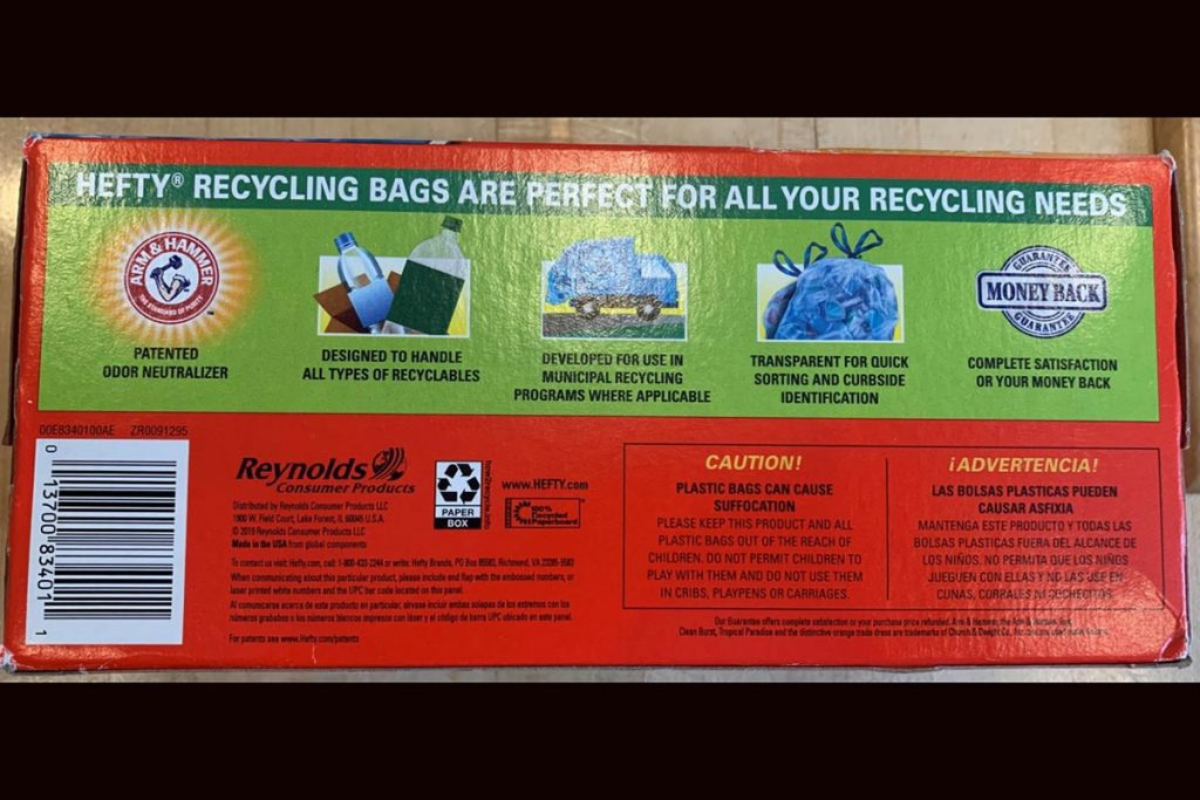
An image of Reynolds’ Hefty Recycling bag box from a lawsuit challenging the recycling-related claims. Reynolds Consumer Products says it has since made wording changes to the packaging. | Screen copy from court filings
Reynolds Consumer Products has agreed to change advertising language and pay up to $4 million to settle one of multiple lawsuits alleging its marketing of recycling collection bags is illegal.
The company has faced numerous legal battles over its Hefty and Great Value brand of recycling bags, which it markets for use in collection of curbside recyclables. The company is dealing with lawsuits from the Minnesota and Connecticut attorneys general, as well as from private individuals, who insist the bags are not compatible with curbside recycling programs.
In July, Reynolds reached a settlement in a lawsuit filed by the private parties, the first known settlement in the similar cases.
The most recent settlement comes after Shana Gudgel, a resident of Titusville, Fla., and Craig Woolard, a San Diego, Calif. resident, filed a class-action complaint against Reynolds in a state court in Lake County, Ill., where Reynolds is headquartered.
The polyethylene bags in question are advertised for holding curbside recyclables, but Gudgel and Woolard insist the bags actually prevent the recycling of any materials they’re holding because very few recycling programs in the U.S. accept bagged recyclables; instead, most programs want recyclables loose in carts or bins, because film tends to jam sorting equipment at MRFs. As a result, the plaintiffs say, Reynolds’ marketing language is deceptive and illegal.
Reynolds has denied the allegations.
In the Connecticut case, for example, the company has pointed to examples of municipal recycling programs that do accept bagged recyclables. And it told the Connecticut court it has made changes to its packaging, including removing an image of a blue recycling truck and the chasing arrows symbol. It has also added the following wording to the box, according to the company: “This bag is not recyclable. This bag is designed for use in participating program areas only – contact your local municipality or recycling center to confirm acceptance.”
Settlement provides for millions of dollars
In the settlement, Reynolds denies all wrongdoing but has agreed to take several steps to end the litigation. The company has agreed to change its marketing language, and the changes appear identical to what the company told the Connecticut court it has already done. Specifically, Reynolds agreed to state that the bags should only be used in municipal programs where applicable, and that the bags themselves are not recyclable. The brand owner also agreed to remove the chasing arrows symbol from the front label of the package “unless such symbols appear as part of a How2Recycle claim.”
The settlement gives the company the right to sell through its remaining inventory with the old labeling, and it won’t have to recall or destroy any products.
The company has also agreed to pay up to $4 million.
According to a class action settlement website that has been set up, all U.S. consumers who bought clear and blue transparent Hefty and Great Value recycling bags between July 20, 2018, and Aug. 30, 2023, are entitled to a payment of $2 for each product they purchased, up to a maximum of $50 per person. Payments to consumers are capped at $3 million total.
Reynolds also agreed to pay up to $975,000 for the plaintiffs’ attorney fees and costs. Gudgel and Woolard will each receive $5,000.
The court gave preliminary approval to the settlement on Aug. 30. The judge has scheduled a final approval hearing for Nov. 15.
It’s unclear what implications the class action settlement in Illinois – or the changes to packaging that Reynolds has already agreed to – might have on the ongoing legal challenges from the states of Minnesota and Connecticut.
Other bag lawsuits around the country
The Gudgel-Woolard case is just one of multiple similar lawsuits around the country.
Reynolds Consumer Products also faced a federal court lawsuit from Oakland, Calif. resident Lisabeth Hanscom, but she voluntarily dropped her case in August 2022.
Earlier this year, San Francisco resident Patrick Peterson filed a complaint in federal court against The Glad Products Co. and its parent company, Clorox, arguing that marketing of the Glad brand recycling bags is deceptive and illegal under California and federal laws. That case is ongoing.
Interestingly, Gudgel has also sued Clorox in recent years, although that case had nothing to do with recycling. In August 2020, after COVID-19 had spread throughout the U.S., she sued Clorox claiming that its “Splash-Less Clorox Bleach” formula had been modified from Clorox’s regular bleach formula and, as a result, was not effective at killing the virus. She insisted the company was deceiving consumers by failing to make the difference clear. Disagreeing, a judge threw out that lawsuit in January 2021.

